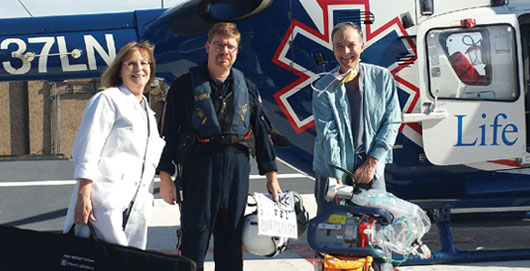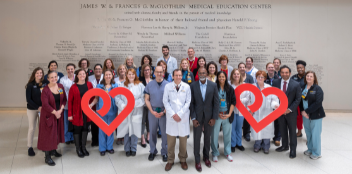Mobile ECMO Program Saves Lives
 Pat Nicolato, D.O., with John Cornett, Flight Paramedic, and Chief Perfusionist Harry "Mac" McCarthy
Pat Nicolato, D.O., with John Cornett, Flight Paramedic, and Chief Perfusionist Harry "Mac" McCarthy
When patients fall gravely ill with respiratory or cardiac distress, Pat Nicolato, D.O., and her team can treat them at VCU Health Pauley Heart Center or travel to their hospital by helicopter or in MOBI, a mobile intensive care transportation rig.
Extracorporeal membrane oxygenation provides cardiac and respiratory support to patients whose heart and lungs are unable to sufficiently function to sustain life. “It’s a little portable system that oxygenates and pumps the blood for the heart and lungs,” said Nicolato, a cardio-thoracic surgeon and the program’s Adult Surgical Director.
ECMO was first used in the neonatal and pediatric population, but VCU initiated its adult program about 10 years ago. “Hospitals throughout the state began calling us when patients were typically coding,” she said. The VCU team treats 40 to 60 adult ECMO cases each year, including pediatric patients who weigh over 110 pounds. The neonatal and pediatric ICUs each care for an additional 5-10 patients annually. VCU owns a total of nine ECMO pumps.
“Placing them on ECMO allows us time to treat with antivirals and other medications, to allow the lungs to recover while the patient is being completely supported.”
VCU treated several patients, including many younger adults, who contracted the deadly H1N1 during the swine flu epidemic in 2009. “What happens is that flu attacks the system so profoundly that the body doesn’t have time to recover before the patient’s lungs fail. Placing them on ECMO allows us time to treat with antivirals and other medications, to allow the lungs to recover while the patient is being completely supported.”
The team, which generally includes a surgeon and perfusionist, has gone to the bedsides of patients throughout the state to cannulate patients—that is, to insert a thin tube into their heart that will connect to the pump—before bringing them back for treatment at VCU Medical Center. Nicolato once traveled across the state to cannulate a patient who had ruptured his lungs. He was brought back via MOBI to VCU, where he remained on ECMO and had surgical interventions. The patient was treated for over a month, but recovered.
There are two types of ECMO. “Veno-veno is strictly for those patients who are in respiratory failure and their heart has good function,” she says. “Veno-arterial is used for those patients who are in cardiac failure, whether it’s because they had an acute myocardial infarction—a bigger heart attack—or they are in congestive heart failure for a number of reasons,” she said. In those cases, ECMO provides a chance for the heart to recover, “or we may use it as a bridge to an assist device or a transplant. All that evaluation is taking place, while we’re supporting them so we don’t have any loss of organs, like kidneys or liver.”
“It’s very rewarding to be able to reach our community to treat such critically ill patients when conventional treatment is failing.”
Back to Winter-2017

